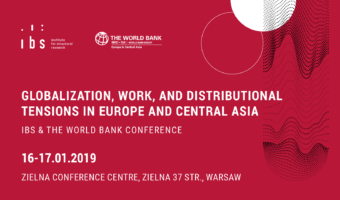The IBS and the World Bank Conference focused on the globalization, work, and distributional tensions in Europe and Central Asia. The conference included presentations by speakers from such highly-regarded research institutions as: Princeton University, World Bank, Norwegian School of Economics, European Bank for Reconstruction and Development, and more. Below you can find the main findings, presentations and photos.
Keynote talk “Welfare Policy and Beyond”
The conference began with a speech delivered by Marc Fleurbaey from the University of Princeton (→ presentation). Fleurbaey posed a question: How to rethink welfare policy in terms of promoting social welfare in general terms? He emphasized that by promoting social welfare he understands much more than just fighting income inequalities, which has recently become the dominant topic in the economic and social debate.

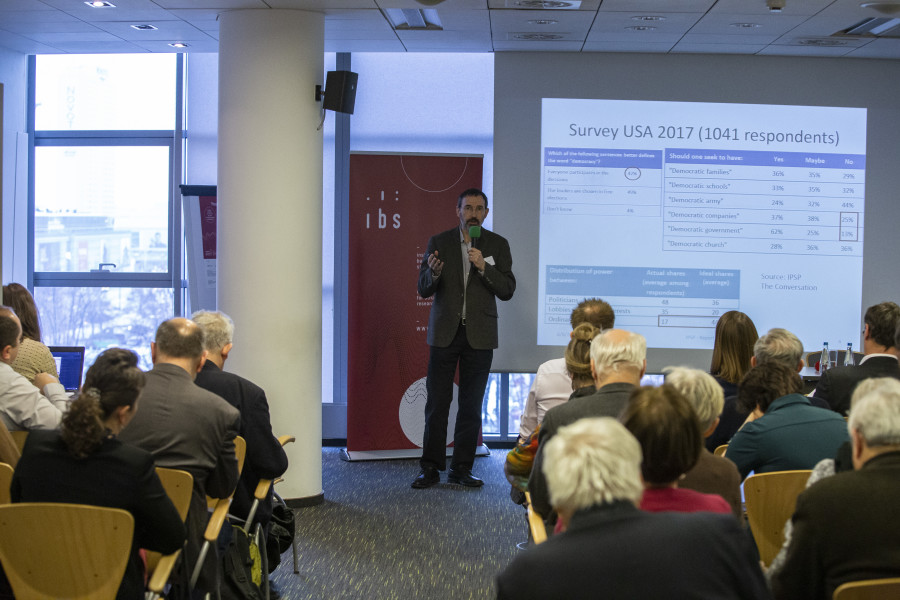
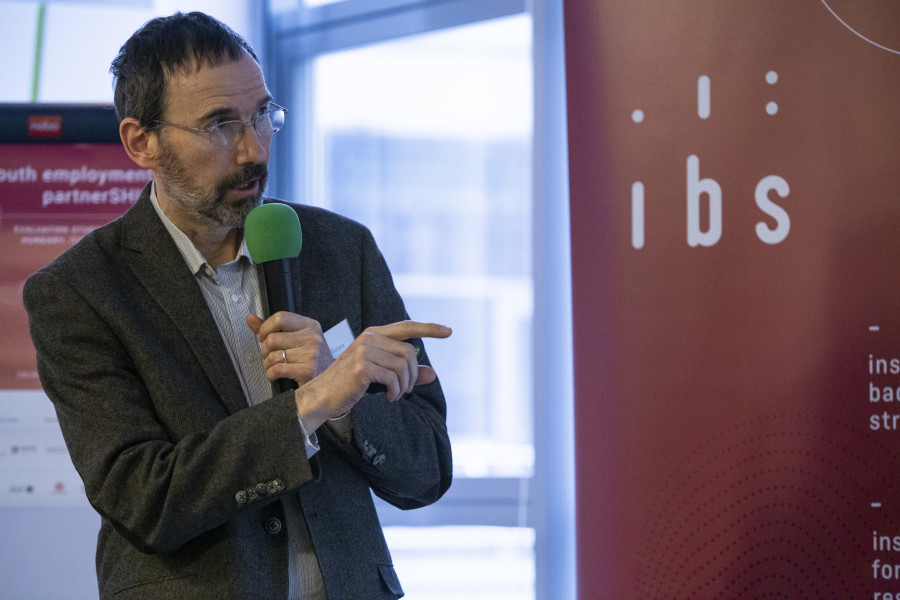
In the first part, Professor Fleurbaey presented the context – several phenomena observed in modern economies, such as low trust in institutions, inequalities, identity movements (declining support for democracy), globalisation and future challenges (technological unemployment, ageing, debt, migrations, environment, etc.). Fleurbaey addressed the issue of measuring social welfare. He pointed to three important aspects that scientists should take into account: outcomes versus opportunities, social relations and the declared level of happiness. Next, Fleurbaey dealt with public policies influencing social welfare. He indicated three categories of such policies:
- Rescue the losers – this may be improved by universal programs, which have better coverage and offer more generous support. Fleurbaey proposes reversing the order of activities in social policy – first we grant help, and then we look at how the situation of the user changes (instead of: first we see whether one meets the criteria, then we grant help).
- Prepare the players – the clue is to give good assets – human capital through education and financial capital. In the latter case, we should not limit inheritance taxes (which happens in many countries) – they can make the opportunities more equal.
- Change the rules of the game – we should more actively promote competition to counteract market concentration. Maybe we should think about slowing down technological innovations? We do not know their effects yet, maybe we should ask, whether the creative destruction is not too destructive?
Summing up the speech, Fleurbaey referred to the Scandinavian model of social policy. He proposed to improve it, by introducing decentralized social democracy. Its basis should be a greater social participation in decisions taken at the level of individual organizations (eg greater share of employees in decision-making process). Fleurbaey said, we should stop treating labour as a cost. He noted that in the current system people are selling freedom for money when they work. Meanwhile, in a democracy you cannot sell your vote. In his opinion more democracy in organisations would be conducive to better management and better control of capital.
World Bank Special Session
Maurizio Bussolo and Iván Torre presented the key findings of the World Bank report “Towards a New Social Contract in Europe and Central Asia“, which they co-authored.
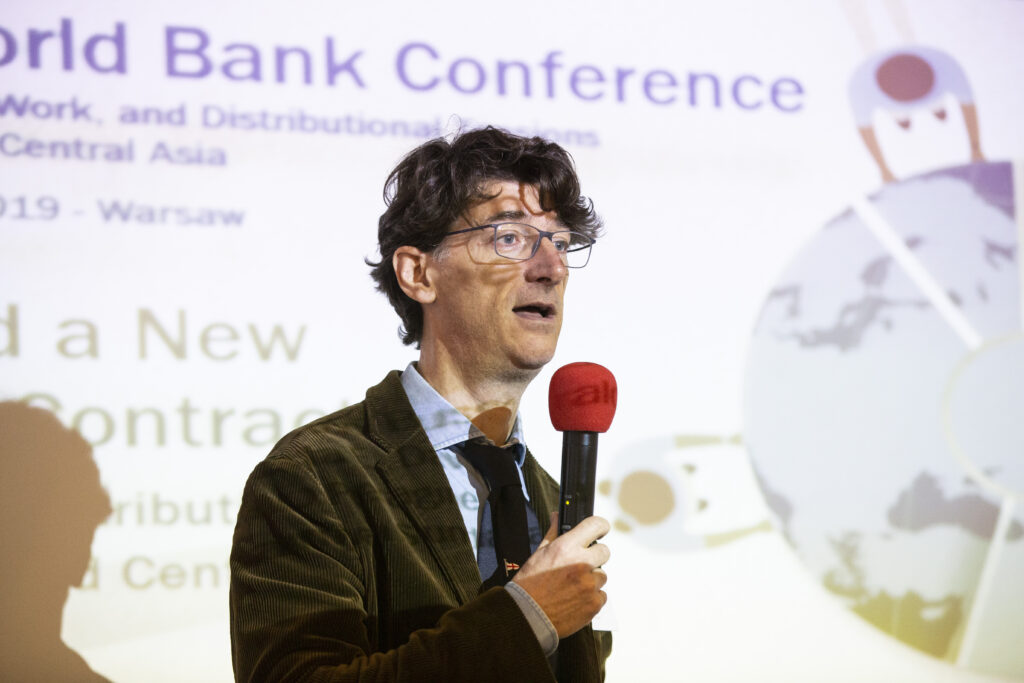
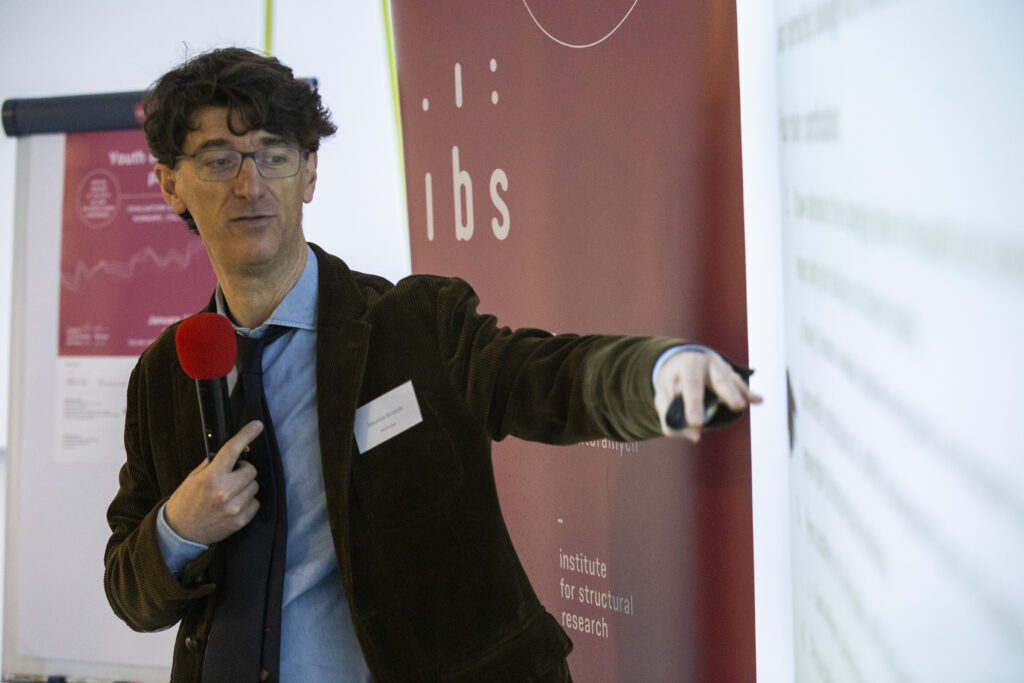
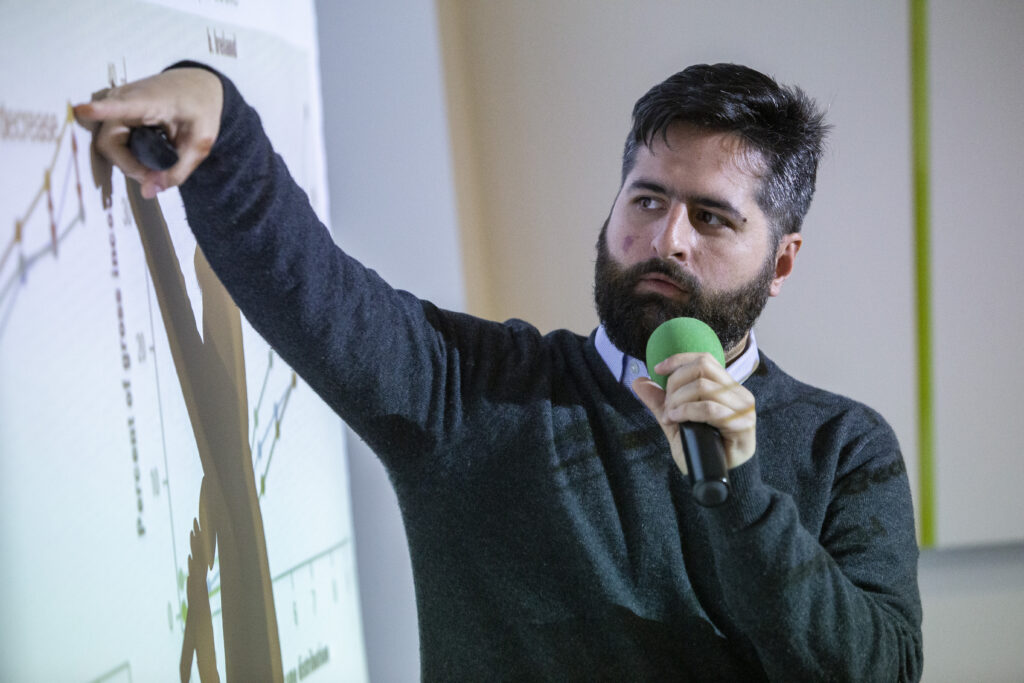
Maurizio Bussolo discussed the changing nature of inequality in Europe and Central Asia under the three forces: globalization, technological change and ageing society (→ presentation). He stressed that the risk associated with changing economy is not shared equally across all groups of the society and some groups are exposed to higher insequrity. For instance, young workers face a higher risk of non-standard employment. Bussolo also raised a question whether a relatively large redustributive systems in Europe are prepared for the new types of inequality and should the social contract be redesigned. He drew three principles which should form a basis for such redesign:
- equal protection of all workers, independent of the type of employment;
- seeking universality in the provision of social assistance and insurance (e.g. by securing basic income) and
- progressivity in a broad tax base.
Iván Torre described the impact of redistribution policies in Western and Eastern Europe (→ presentation). He observed that in Western Europe the redistributive policies lead to decrease in inequality in recent years. The results for Eastern Europe are mixed. For instance, in Hungary the flat tax policies has increased inequality. However, redistributive policies led to a drop in inequality in the Baltic states.
Wages
Session on wages began with a presentation from Joanna Wolszczak-Derlacz (Gdansk University of Technology), who analysed the impact of the position in global value chains on wages in Central and Eastern European countries (→ presentation; paper). She showed that the wages are higher in industries which are at the beginning or at the end of the production chain than in the middle. The production fragmentation is associated with a decline in wages but only for sectors that are near the final demand.
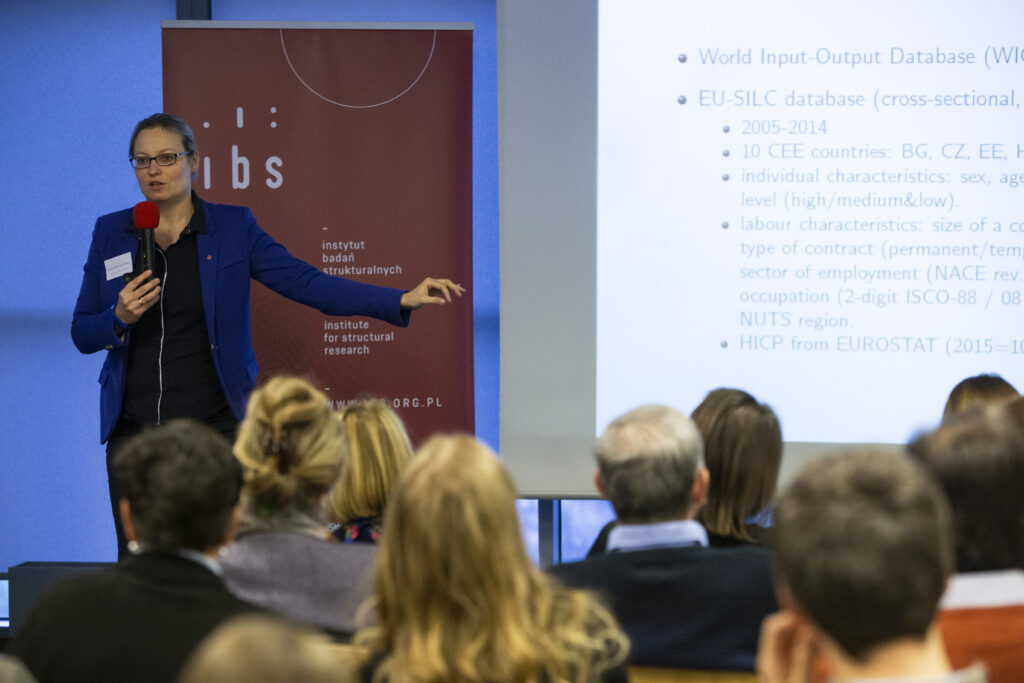
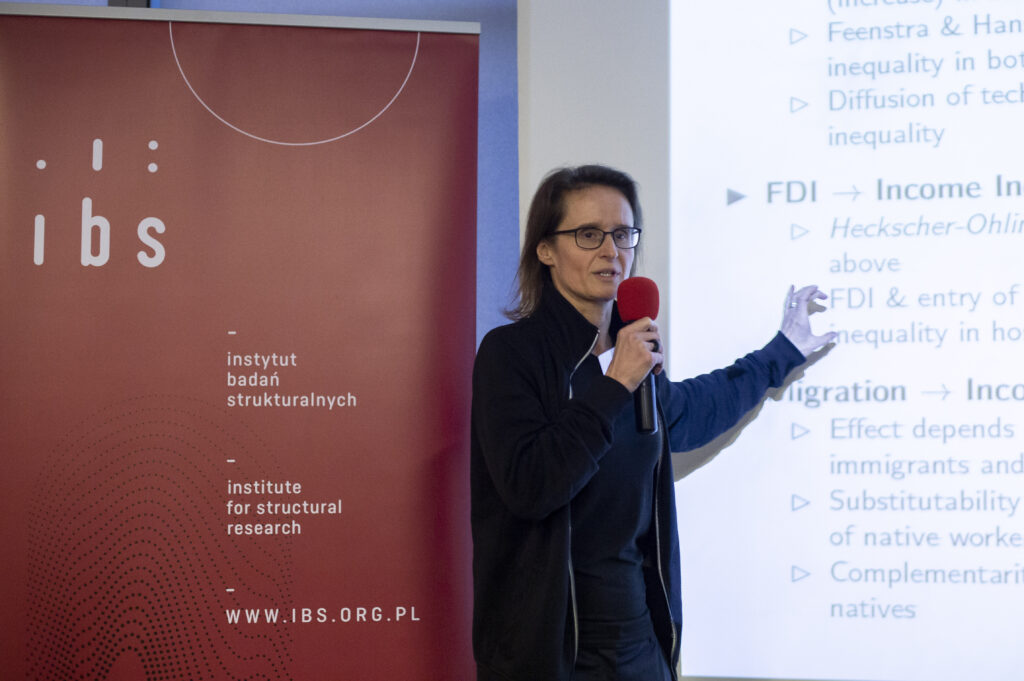
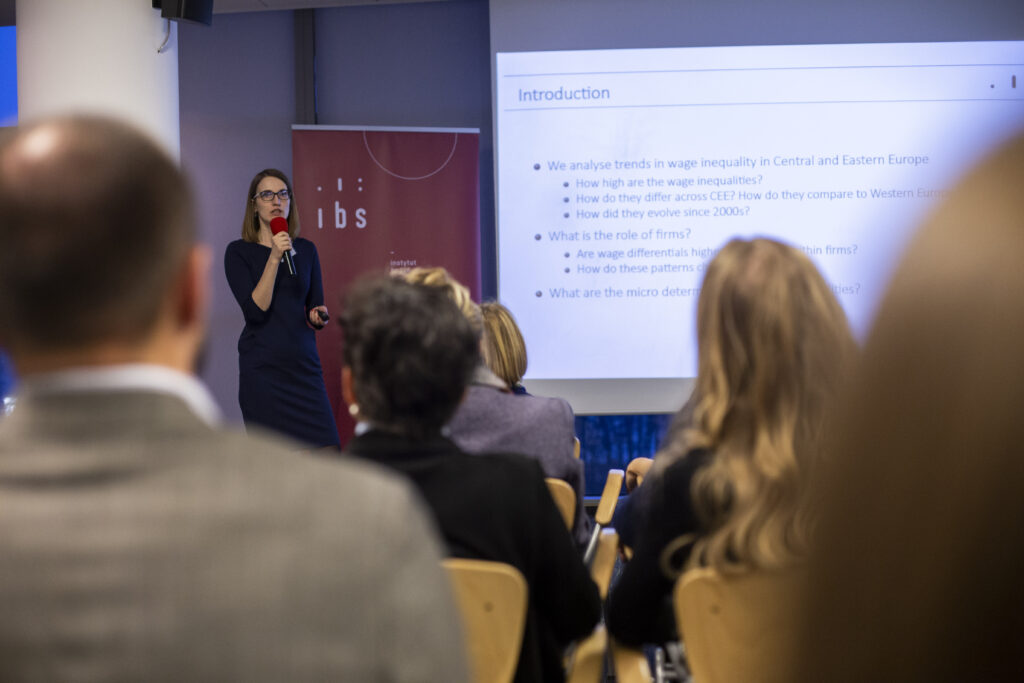
Sandra M. Leitner (the Vienna Institute for International Economic Studies) presented her findings on the impact of three globalization forces on wage inequality among native employees in the EU countries (→ presentation). According to her research, migration contributes to wage inequality in Southern European countries. She found no clear pattern in terms of trade and foreign direct investment effect. Iga Magda (IBS) continued the topic of wage inequality, focusing on the Central and Eastern European countries and the firm context (→ presentation). She argued that most of the inequality levels are explained by the between-firm component rather than within-firm component. Job and firm level characteristics (such as occupation, NACE, public or private sector) are the determinants of higher variance of wages but the characteristics of co-workers also play a role.
Youth Employment PartnerSHIP special session
During the last session of the first day of the conference the project “Youth Employment PartnerSHIP” was inaugurated. Speakers delivered presentations on the impact of a minimum income scheme in Spain, flexible hours for young mother as well as traps of being a temp in Italy.
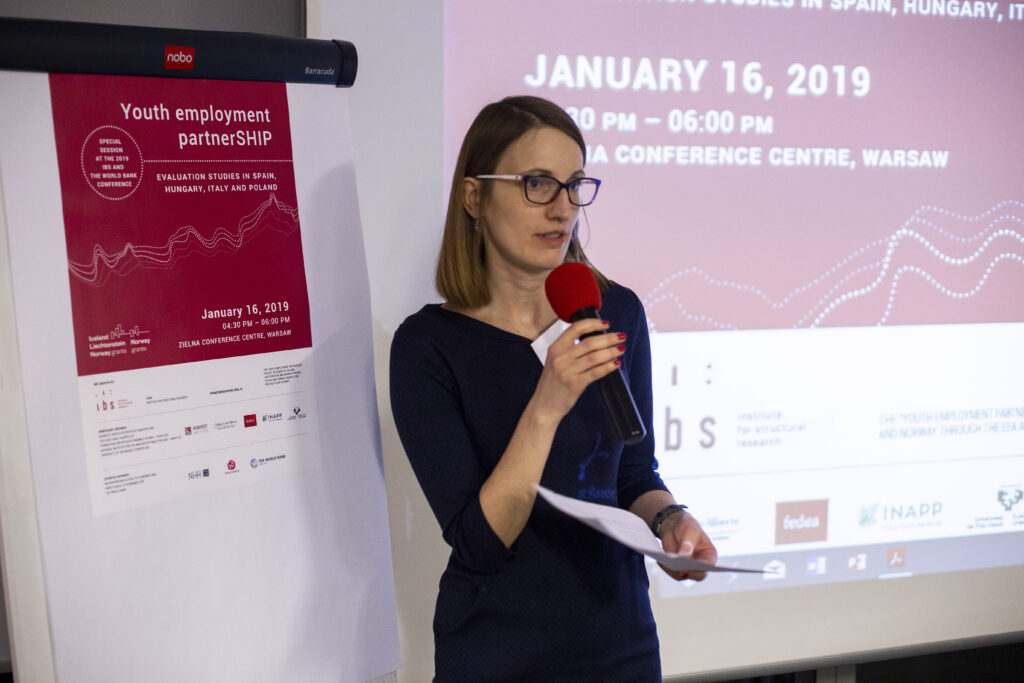
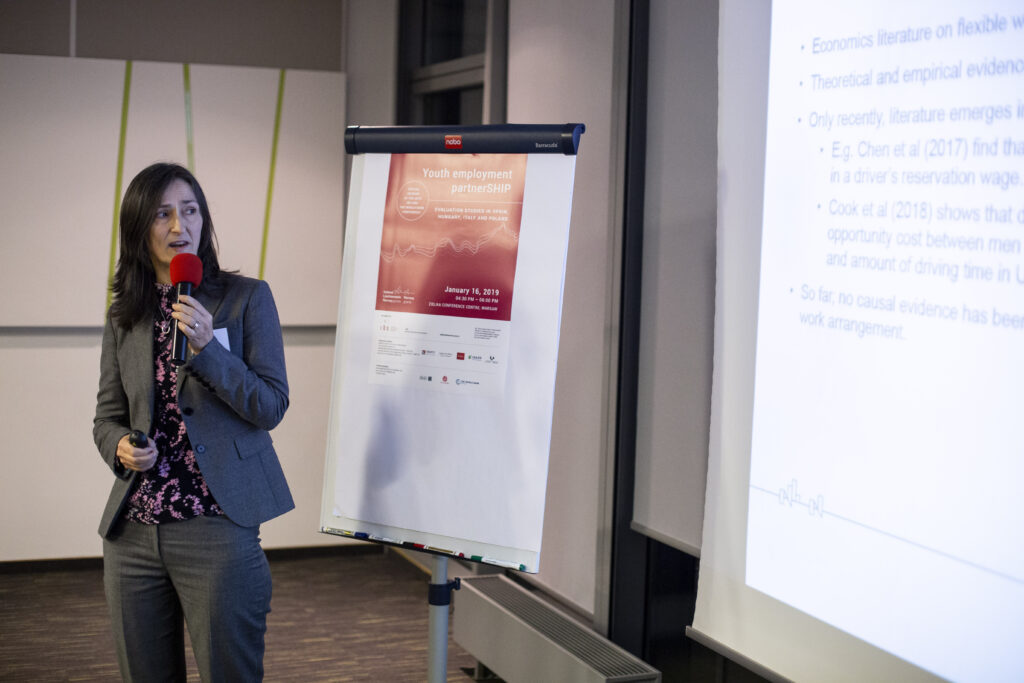
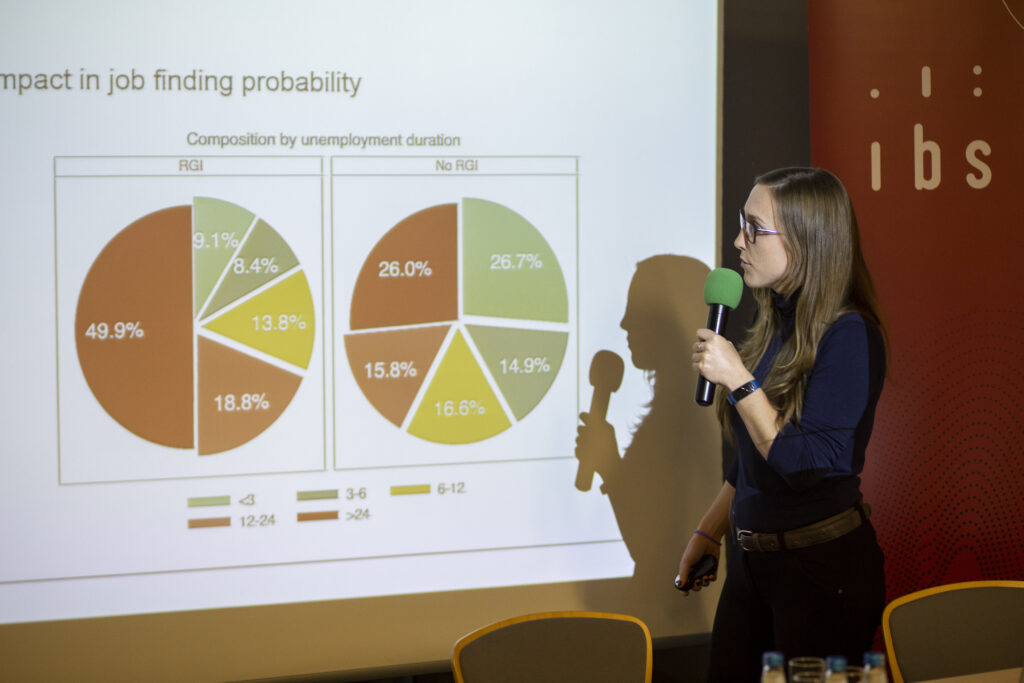
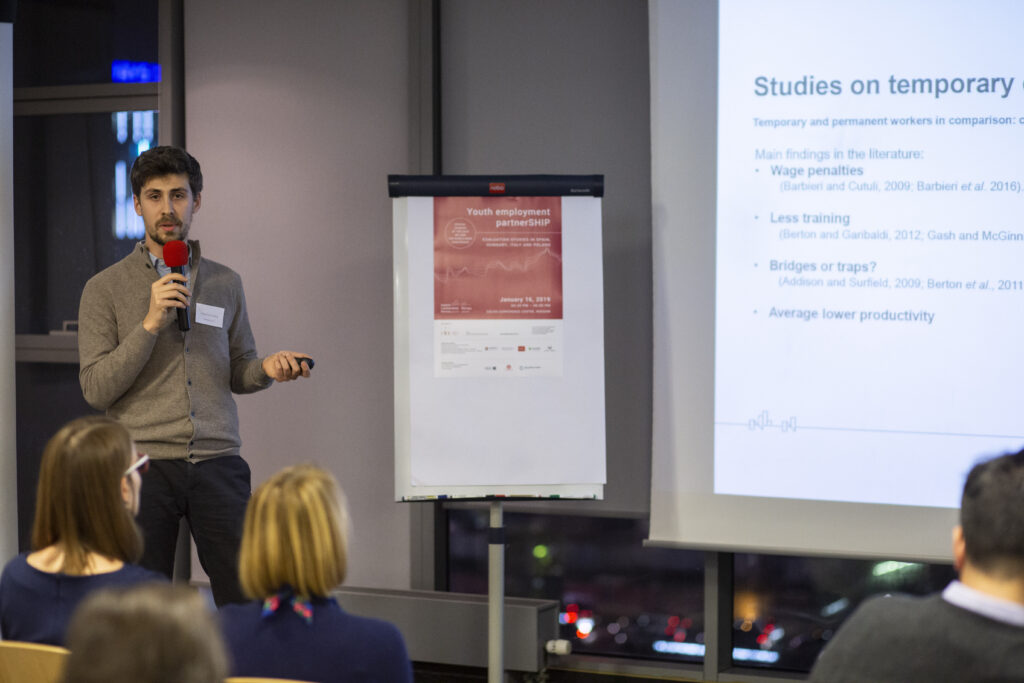
Lucia Gorjon from the University of the Basque Country showed that the minimum income scheme in the Basque Country on average do not delay entry into the labour market of its beneficiaries (→ presentation; paper). She also showed that the public employment services, especially the training programmes, increases the probability of finding a new job for minimum income scheme beneficiaries. Astrid Kunze from the Norwegian School of Economics has found that after a childcare reform in Norway has been introduced, mothers of young children are more likely to use non-ordinary work hours to increase family-work balance (→ abstract). She argued that childcare policy and traditional parental leave policy are both important tools to help mothers stay in the labour market. Francesco Trentini from the University of Torino showed that temporary contracts in Italy induce a negative effect on employability (→ presentation). He claimed that formal contract history is an important proxy of individual ability, concluding that temporary contracts induce scarring effects on new entrants.
Policy Panel – Globalization, work, and distributional tensions in Europe and Central Asia
During our panel moderated by Iga Magda, Marc Fleurbaey (Princeton University), Carlos Piñerúa (World Bank Country Manager for Poland and the Baltic States), Paweł Wojciechowski (Chief economist of the Polish Social Security Institution – ZUS) and Tomasz Chróstny (Director of the Department of economic analysis in the Ministry of Enterprise and Technology) all shared their insights on how to deal with the challenges posed by the emerging forms of inequality in Europe and Central Asia.

Marc Fleurbaey highlighted the role of very secure safety nets including universal basic income, investing in retraining and in life-long learning. In his opinion labour market has to become more friendly for people in the longer run. Carlos Piñerúa claimed that the feeling of being left behind has little to do with the level of income as people look rather at convergence. Also the quality of public services is very important. A part of the discussion concentrated on the issues around taxation. According to Paweł Wojciechowski people do not distinguish between taxes and social insurance and transparency about the different contributions should be the key. Marc Fleurbaey, asked if we should expand the taxation base by capital/wealth taxes to finance welfare state, claimed that taxes on capital do not go with the investment planning. He would rather see higher inheritance taxes, taxes on externalities and rent taxes as rents are not real contributions to the economy. Carlos Piñerúa raised the issue of tax avoidance: we need not only more taxes but fair taxes. Tomasz Chróstny commented on the introduction of “small ZUS” policy. According to him, it will increase the purchasing power and investments of over 1.6 million micro firms and self-employed. It will allow them to become small and medium enterprises in the longer run. According to Paweł Wojciechowski, in terms of social security system “small ZUS” means subsidies to minimum pensions in the future and Poland does not address the challenges posed by new form of work regarding social security.
Institutions and opportunities
Alexandru Cojocaru (World Bank) opened the session with a paper explaining expected socioeconomic mobility of an individual by his/her social connections and their perceived importance (→ presentation). Using survey data from Europe and Central Asia, it is shown that in developed countries with good institutions the relationship between own expected mobility and individual perception of having important connections is nonexistent. A different outcome is observed in developing countries: people without social connections expect worse social mobility. Cevat Giray Aksoy (European Bank for Reconstruction and Development) used empirical data and instrumental variable method to explain changes in attitudes against incumbent politicians by shifts in international trade composition (→ paper). Main conclusions are that an increase in skill-intensive exports induce higher support for incumbent politicians among the high-skilled, whereas an increase in skill-intensive imports decrease the support for the incumbents in among the skilled. Moreover, no impact of skill-intensive trade is found on the low-skilled workers. Lia Pacelli (University of Torino) focused on a newly adopted reform of the employment protection legislation in Italy. The new policy introduced a possibility of reducing firing costs for workers by decreasing severance payments. Using the difference-in-difference estimation among eligible and non-eligible workers, Lia Pacelli showed that effects of the reform on employment are positive but the positive effects for employment are lower for more educated workers and those holding previously more intellectually demanding jobs.
Technology and labour
Uwe Blien (Institute for Employment Research – IAB) exploits in his paper data on mass layoffs in Germany to describe workers’ ability to adjust to economic shocks, depending on the intensity of routine tasks in their occupations (→ presentation; paper pre-publication). It turns out that most significant differences between routine and non-routine occupations show up in the earnings adjustment. Adjustments in the employment duration are also present though. Piotr Lewandowski (Institute for Structural Research – IBS) presented a paper explaining a shift from routine to non-routine tasks among developed countries (→ presentation). The main contribution is the notion that adoption of technology (computers) affects the shift to routine tasks most. Secondly, globalization leads to more routine jobs in poor countries and less routine jobs in the developed ones.
Films ↓
production: Kuba Kiljan
Photo Gallery (all photos by Kuba Kiljan)
 Agenda_2019_IBS_WB-globalization_work_distributional_tensions.pdf
Agenda_2019_IBS_WB-globalization_work_distributional_tensions.pdf
 Fleurbeay-M.-Welfare-policy-and-beyond-1.pdf
Fleurbeay-M.-Welfare-policy-and-beyond-1.pdf
 Bussolo-M.-Towards-a-New-Social-Contract.-Taking-on-Distributional-Tensions-1.pdf
Bussolo-M.-Towards-a-New-Social-Contract.-Taking-on-Distributional-Tensions-1.pdf
 Torre-I.-Vertical-and-Horizontal-Redistribution.-The-case-of-Western-and-Eastern-Europe-1.pdf
Torre-I.-Vertical-and-Horizontal-Redistribution.-The-case-of-Western-and-Eastern-Europe-1.pdf
 Leitner-S.-The-Relative-Impact-of-Different-Forces-of-Globalisation-on-Wage-Inequality-1.pdf
Leitner-S.-The-Relative-Impact-of-Different-Forces-of-Globalisation-on-Wage-Inequality-1.pdf
 Magda-I.-Firms-and-Wage-Inequality-in-Central-and-Eastern-Europe-1.pdf
Magda-I.-Firms-and-Wage-Inequality-in-Central-and-Eastern-Europe-1.pdf
 Wolszczak-Derlacz-J.-Position-in-Global-Value-Chains-and-its-Impact-on-Wages-The-Case-of-Central-and-Eastern-European-Countries-1.pdf
Wolszczak-Derlacz-J.-Position-in-Global-Value-Chains-and-its-Impact-on-Wages-The-Case-of-Central-and-Eastern-European-Countries-1.pdf
 Gorjon-L.-Assessing-the-Impact-of-a-Minimum-Income-Scheme-in-the-Basque-Country-1.pdf
Gorjon-L.-Assessing-the-Impact-of-a-Minimum-Income-Scheme-in-the-Basque-Country-1.pdf
 Trentini-F.-Jumping-into-traps-the-scarring-effect-of-being-a-temp-1.pdf
Trentini-F.-Jumping-into-traps-the-scarring-effect-of-being-a-temp-1.pdf
 Cojocaru-A.-Inequality-of-access-to-opportunities-and-socio-economic-mobility.-Evidence-from-the-LiTS-Survey-1.pdf
Cojocaru-A.-Inequality-of-access-to-opportunities-and-socio-economic-mobility.-Evidence-from-the-LiTS-Survey-1.pdf


